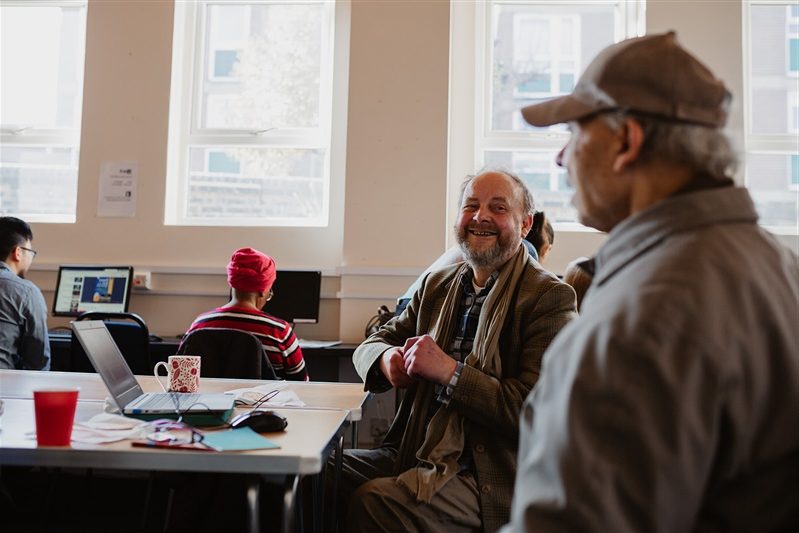Power Up 2.0: One year on
Power Up 2.0, financially supported by JP Morgan Chase Foundation, follows the initial Power Up project which ran through the Covid-19 pandemic. Our Network Delivery & Customer Support Manager, Jonathan Bradwell, writes about the achievements of the Power Up 2.0 projects so far.
Back in March 2022, which marked the start of Power Up 2.0, the midpoint seemed like a lifetime away. But here we are, and what a first year it’s been.
Power Up 2.0, financially supported by JP Morgan Chase Foundation, follows the initial Power Up project which ran through the Covid-19 pandemic. Both initiatives focused on two themes; jobs and skills and financial health. In the second phase we onboarded nine grantees across East London, Bournemouth, Glasgow and Edinburgh.
I’d like to tell you a little about each project and what’s been achieved so far.
‘Powering up people’ – what impact have we had on people?
Simon Community Scotland, based in Edinburgh and Glasgow, have developed a three pronged approach to helping homeless people get online and access the services they need. It starts with a device, then data, followed by support from Digital Champions. To date they have distributed over 300 devices through ‘Get Connected 500’, also funded by Scottish Government.
In East London, social enterprise Renaisi Limited are focusing on embedding digital skills into their existing employability provision through their ‘Wise Horizons’ programme. They’re now entering their fourth cohort which will see another 20 people over the age of 50 get access to group and one-to-one support to move closer and into employment.
Very much a ‘test and learn’ project, Generation are piloting adapting an existing AWS (Amazon Web Services) Bootcamp and IT Support programme to cater for single parents in a programme called ‘You Employed, UK’. The first cohort, benefitting from access to childcare costs and a flexible schedule of learning, just had a graduation to mark the completion of their course.

‘Powering up place’ what impact have we had on the availability of support in the local area?
Going to where people are rather than asking them to come to you is a key principle of The Salvation Army – East of Scotland Divisions ‘Edinburgh Employment Digital Support’ programme. As well as working to set-up two new Hubs in two different parts of the city, a strong partnership with the Job Centre has seen them promote their support even further across Edinburgh.
Likewise, at the opposite end of the UK, Bournemouth Churches Housing Association have developed a similar outreach model through ‘Digital Bournemouth’. In one year they’re offering eight locations where people can get support, including six libraries. They’ve also launched a device scheme enabling people to access support when they need it, wherever they may be.
Creating referral pathways is a big part of creating a place based approach, and this is something Providence Row, a homeless charity in East London, have really thrived on through their ‘Employability and Progression’ programme. Over the past few months two partnerships with organisations supporting vulnerable adults have been successfully established.
‘Powering up provision’ – how are we making sure organisations are better equipped?
City Gateway are delivering a programme called ‘Skill Up. Switch On’ that focuses on embedding digital skills across their whole provision through upskilling staff to support young people in East London. The organisation has done a thorough review of their entire learning curriculum, making improvements to allow digital skills to be a key element.
The final two segments of a new digital skills pathway are at the build stage for The CRUMBS Project in Bournemouth through their ‘CRUMBS Digital Paths’ programme. This pathway will take disadvantaged adults through the basics and on to skills such as using email and online banking. The impact of this project could be on a national scale as other charities supporting disadvantaged adults may find this something they wish to replicate.
Similarly, Deaf Action in Edinburgh is also establishing a model that other organisations who support those who are deaf or hard of hearing could take inspiration from. They’ve supported people with both digital and employability skills. The team is going the extra mile providing translators for job interviews and helping employees themselves prepare too.
–
It’s been extremely rewarding to be able to provide support to each of these nine organisations and I’m looking forward to seeing what the next twelve months holds. Hopefully this has given you a taste of what’s been happening on Power Up 2.0, but if you’re interested in finding out more, please visit the project landing page.

Jonathan Bradwell
Network Delivery & Customer Support Manager
At Good Things Foundation, Jonathan is responsible for the delivery of a number of our grant funded programmes, as well as quality and delivery assurance across our portfolio of projects. Alongside this, Jonathan manages the team that offers support to our community partners delivering our projects and using our websites.
